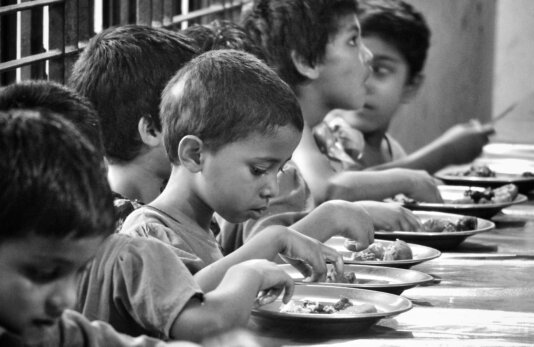- About
- Topics
- Picks
- Audio
- Story
- In-Depth
- Opinion
- News
- Donate
- Signup for our newsletterOur Editors' Best Picks.Send
Read, Debate: Engage.
| topic: | Food Security |
|---|---|
| tags: | #food security, #malnutrition |
| located: | Sierra Leone, Bangladesh, France, Sri Lanka |
| by: | Afshan Khan |
Good nutrition is the foundation of a stable and prosperous world, but right now our food systems are failing us. From undernutrition to obesity, every country is grappling with malnutrition in one form or another.
Almost 50 per cent of deaths among children under five are caused by undernutrition. This is an estimated 2.25 million children - more than the number of children under five in Spain, Poland, Greece or Portugal. At the same time, more than 880 million adults live with obesity.
But the impact goes beyond health. Poor nutrition deepens economic inequality and instability, and holds back childhood development, limiting opportunities for millions. Countries lose up to 16 per cent of their national GDP every year, and globally, the annual cost of not addressing malnutrition is estimated at USD 3 trillion.
Although the Global South is worst affected by undernutrition even as obesity rates continue to rise, its impact is not confined by a country’s boundaries. Malnutrition and food insecurity has fuelled political instability and conflict across the Sahel and Horn of Africa, causing widespread humanitarian crises and triggering mass displacement across borders. Worsening climate conditions, particularly drought, are predicted to increase the likelihood of wasting and underweight by nearly 50 per cent.
While finance plays an important role addressing immediate needs, this is only one piece of the puzzle. Strengthening food systems and integrating nutrition into development strategies can break this cycle and reduce dependence on short-term aid and fostering sustainable growth and stability.
Better integrating nutrition into policies, interventions and investments, for example, can leverage existing government funds and initiatives to improve nutritional outcomes. This approach has the potential to create a multiplier effect, driving systemic, long-lasting change.
For instance, embedding nutrition within health policies helps to set children up for healthier futures and allow them to reach their full potential while reducing the burden on health services. At the same time, this breaks the malnutrition-disease cycle and prevents would-be pandemics.
In Bangladesh, this is already under way. By attaching nutrition interventions to existing prenatal vaccination programmes and routine childhood immunisations, childhood stunting has reduced by more than 50 per cent since 1997, with under-five child mortality down 80 per cent.
In Sierra Leone, through the National Food and Nutrition Security Policy and, more recently, the Feed Salone strategy, the national government has integrated nutrition into agricultural policies, successfully reducing stunting by more than three per cent. Ambitious goals have been set to reduce chronic hunger by 50 per cent in the next three years, with strategic investments in nutrient-rich foods such as vitamin A-enriched orange-fleshed sweet potato driving this progress.
Sri Lanka is another example of the power of integrating nutrition and education. The National School Meal Program provides more than 1.3 million children across almost 9,000 schools with nutritious, locally-sourced school meals. This intervention has not only drastically improved nutritional outcomes, but succeeded in raising school attendance by as much as 98 per cent.
These initiatives demonstrate how nutrition integration commitments drive tangible progress. But to fully realise this potential and reduce malnutrition to zero, we need to mobilise and sustain commitments globally.
Last week, the world took a significant step forward towards addressing malnutrition. As the Nutrition for Growth Summit in Paris concluded, the UK’s Foreign, Commonwealth and Development Office (FCDO) launched the Global Compact for Nutrition Integration with support from the Scaling Up Nutrition (SUN) Movement.
Based on the Compact, more than 50 countries and organisations have signalled their support to form a Coalition for Nutrition Integration. This collective effort will unite partners across health, agriculture, economics, trade and climate to offer governments, businesses and civil society support with implementing nutrition integration commitments.
Defeating malnutrition starts with the collective realisation that this problem is everyone’s business, and it is getting worse. As populations grow fastest in the countries that are worst affected, the cost of inaction is accelerating upwards. Some forecast that the cost to the global economy could reach $41 trillion within the next 10 years.
Malnutrition isn’t just a health issue - it’s an economic and global security challenge. Addressing it requires a united effort across all sectors. The choices we make now will determine whether we continue down a path of growing inequality and instability or seize this moment to build a healthier, more prosperous world for all.
Afshan Khan is Coordinator of the Scaling Up Nutrition (SUN) Movement and UN Assistant Secretary-General.
Image by Imdadul Hussain.
